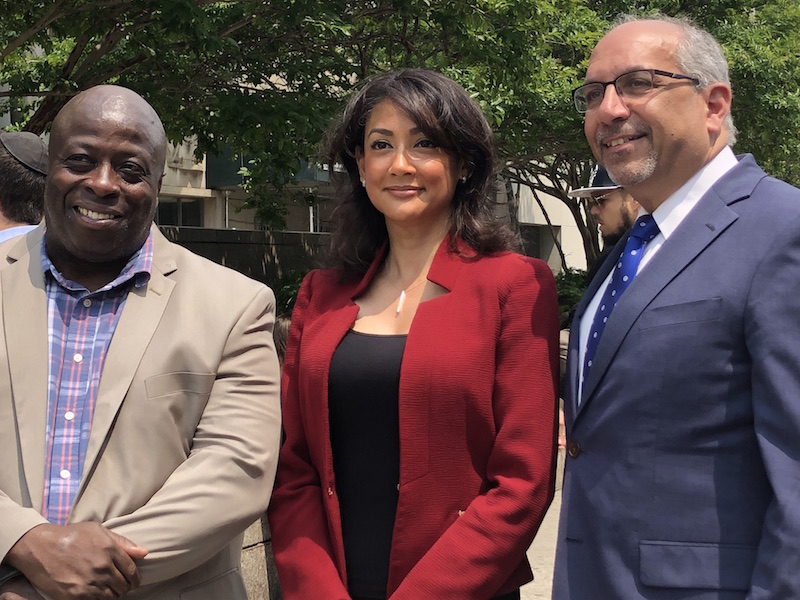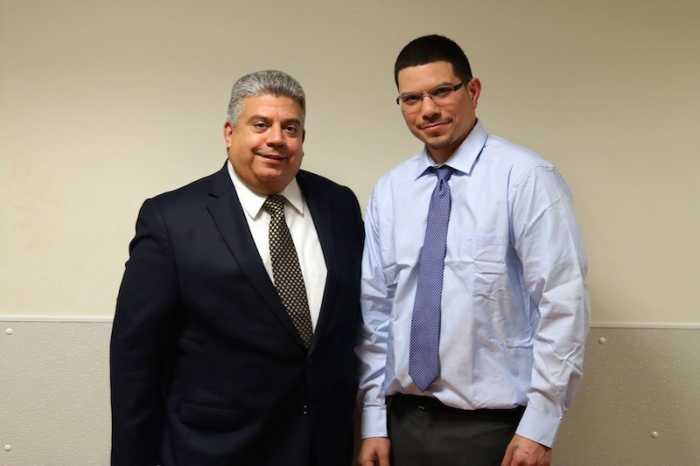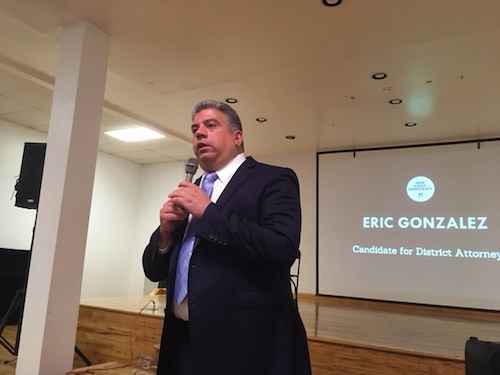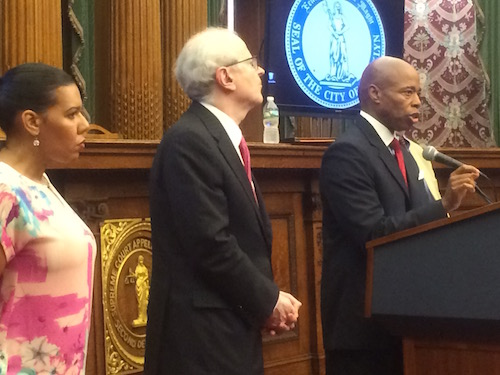On the heels of the Central Park Five four-part Netflix series When They See Us (2019), Mina Malik, the former executive director the Civilian Complaint Review Board, gathered near the steps of the Queens County Criminal Court in Kew Gardens on Wednesday with her supporters to unveil her plans to implement a Conviction Review Unit for the Queens District Attorney Office that she is running for on June 25.
Standing in her corner was David McCallum, a wrongfully convicted man who spent nearly 30 years in prison of a life sentence for a murder that he did not commit and was exonerated from with the help of the Brooklyn Conviction Review Unit that Malik spearheaded while working as special counsel for former Brooklyn DA Ken Thompson.

“Queens is the only county in New York City that does not have a Conviction Review Unit and it is high time that it has gotten one,” said Malik. “Ken asked me to build up a meaningful conviction review unit and an independent one, staffed it with 10 assistant district attorneys who were interested to do the work, three investigators and one support staff member.”
In 2014, the unit was formed and received over $1 million from the city, according to Malik.
“The Conviction Review Unit was tasked with looking for wrongful convictions based on actual innocence and based on possible Constitutional errors,” said Malik. “The Queens Conviction Review Unit will be similar to the Brooklyn Conviction Review Unit. Right now the Brooklyn Conviction Review Unit is the gold standard and is a national model for the entire country.”
If elected, Malik intends to have a Queens CRU up-and-running as soon as possible with independent prosecutors with no ties to the NYPD and with investigators who are dedicated to uncovering the truth.
“Out of all the candidates, only Mina Malik has the experience of having worked and run agencies, and has worked as a district attorney and has a proven track record in reform and forming a conviction review unit. So on day one, she will be able to lead the office and make the changes that are necessary,” said Oscar Michelen, the lawyer who represented McCallum. “She was the first person who looked at David’s case and was instrumental in exonerating him and his co-defendant.”
Malik plans on reviewing the policies and the procedures that have often led to wrongful convictions in Queens.
“We are going to make sure that we have open file discovery so that justice is not administered by trial by ambush,” said Malik. “We are going to make sure there is proper training in place for assistant district attorneys and the investigators on the cases so that we do not have wrongful convictions in the future.”
The former prosecutor believes that open file discovery is essential to a fair judicial process.
“People are entitled to know what the evidence is against them when they are accused of a crime so they could make informed decisions about their cases and what they want to do with their cases going forward,” said Malik. “If you are accused of a crime you deserve to know what the complainant is saying about you, what witnesses are saying about, what DNA evidence they may have and what medical evidence may be held against you.”
Malik does not have a current budget in mind for a Queens CRU, but similar to the Brooklyn CRU will base the amount necessary for funding on the number of wrongfully convicted cases there are in the borough.
“Looking at those claims of wrongful conviction will help us determine how big the unit needs to be and how big the staffing needs to be,” said Malik. “What is important to note though is that we need to have staffed with people with no connections to the police officers or the detectives who investigated the cases, the prosecutors who tried the cases, the judges who sat in judgment in the cases as well as any of the politics that may influence the convictions here in this case.”
In 1985, similar to the teens that were wrongfully accused in the Central Park Five case, McCallum and his friend William Stuckey, 16, were arrested and interrogated for several hours without their parents present and without lawyers and coerced into giving false allegations about each other, according to the wrongfully accused.
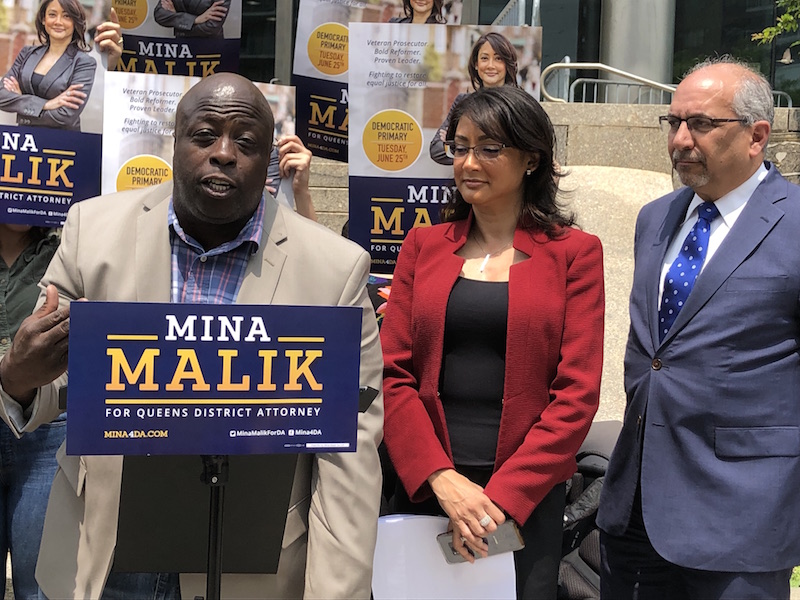 A year later, McCallum and Stuckey were sentenced to life in prison for the kidnapping, carjacking and murder of Queens man Nathan Blenner, according to McCallum.
A year later, McCallum and Stuckey were sentenced to life in prison for the kidnapping, carjacking and murder of Queens man Nathan Blenner, according to McCallum.
“Stuckey was asked questions about his involvement about the case and the police would beat him up,” said McCallum. “As a result of the physical abuse, he said that I was the person who killed Mr. Blenner. I was arrested three hours later to a windowless room and when I denied it they slapped me in the face. He threatened to hit me with a chair if I didn’t tell them what they wanted to hear, so, unfortunately, I made a false statement implicating Stuckey as the shooter.”
Despite holes in their accusations against each other, the lack of DNA evidence, and the fact that neither McCallum nor Stuckey had licenses to drive, the false statements were enough to convict the two for life, according to Michelen.
After refusing to take a plea deal for a minimum of 15 years that would have came with a false confession, and his refusal to show remorse for a crime he didn’t commit at four parole board meetings for a shorter sentence, McCallum started taking up letter writing to reach out to anyone who would listen to his wrongful conviction claim, including former boxer Rubin “Hurricane” Carter, who was once wrongfully convicted for a triple murder and later became a criminal justice advocate.
“My federal appeals of conviction was exhausted,” said McCallum. “I wrote to him in 2003 and he responded two weeks later.”
That letter would be his saving grace because in 2004 Carter reached out to Michelen who is a wrongful conviction lawyer.
“There was a witness that was interviewed and we found out that the DA withheld that evidence,” said Michelen. “They said they never interviewed her. She said she gave a description that didn’t match David or Willie and she was willing to come down and look at lineups. She was given a mugshot book with their pictures in it and couldn’t identify anybody. They lied on the stand and said she was on a different case.”
When Thompson became the Brooklyn DA, McCallum’s case was finally heard.
“He had put Mina on it,” said Michelen.”It only took someone to take her time and look at the case fairly.”
McCallum was released from prison in 2014, Stuckey died of a heart attack after serving 16 years in prison before his name was cleared.


